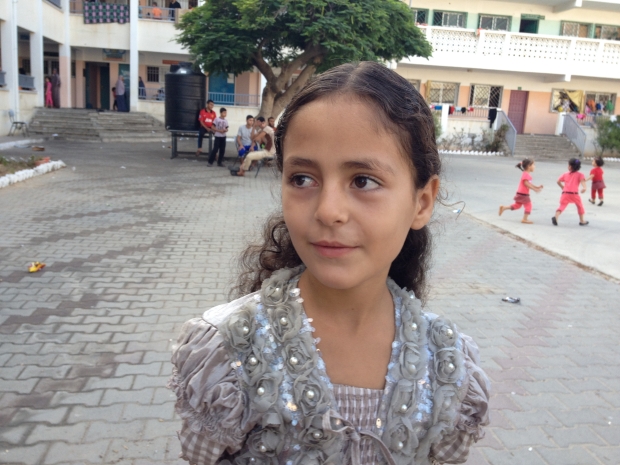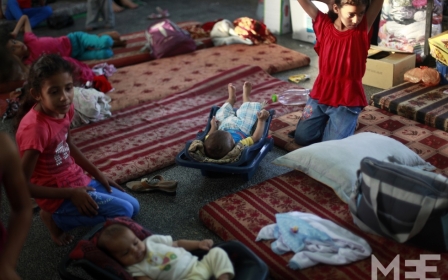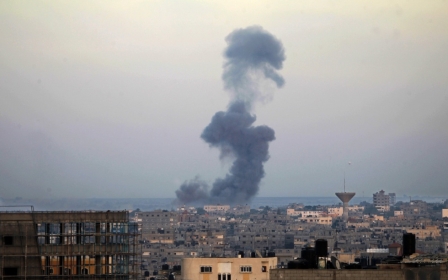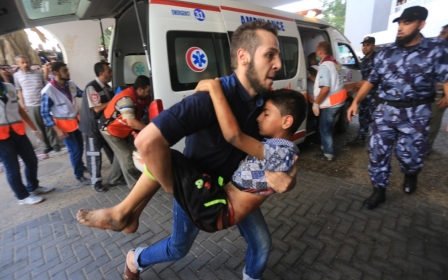When a shelter is a target
GAZA CITY - “In the night, I am frightened by the bombings, missiles and the thought of the blood of injured people in the street,” says 8-year-old Karam Abu Shanab.
“I can’t sleep in the night, my mind is filled with bad images from the Israeli bombs,” he tells his mother, who says her other three children: Saleh, Malak and Sjoud are all unable to sleep - after hearing how children were bombed in their sleep at the UNRWA schools in Jabalyia.
Karam is now taking shelter at the al-Rafdeen school in Gaza City. Among the children there is constant talk about it being bombed and how parents cannot put a stop to it all.
At least 19 died in the attack on Jabalyia refugee camp and another 200 were injured. Israel has been accused of breaking international laws over the strike, which was also condemned by the UN as “a source of universal shame".
Families such as Karam, his mother and his three brothers went to the shelter believing that it would be safe place to take refuge - but no-one is safe.
“Everyone is a target here, but where else should we go?” asks Umm Karam, while holding children who fear the next Israeli airstrike. “Everyday” she says to MEE. “I look at my children, and hug them to make them feel safe and sound.”
About 10 days ago, Karam Abu Shanab lost his home and all of his clothes and belongings in the bombardment of eastern Gaza City. Now al-Rafedeen School is the only shelter he has. His home was one of 747 homes damaged or totally destroyed since Israel’s present offensive began, more than 3 weeks ago.
According to the United Nations, more than 240,000 Palestinians have now sought refuge at UN or government-run schools, informal shelters or with relatives and friends.
Inside the UNRWA schools, Gaza’s refugees don’t feel safe. Some fled the schools to find other shelter after Israel attacked its second UN school in a week on Wednesday - a UN school that Israel knew was being used as a civilian shelter.
According to the United Nations, this brings the toll of schools attacked and damaged to at least 133 facilities, and another 23 health facilities have also been targeted.
Umm Ahmed Suhawil, 54, knows that schools are targeted, so she has considered trying a hospital, but this is not a safe option either because hospitals have also been directly targeted by Israeli gunfire.
On Thursday morning, an Israeli artillery shell hit al-Aqsa hospital in Deir el Balah, central Gaza, leaving 1 nurse injured. The week before, the same hospital was hit by 10 Israeli tank shells leaving five dead and 70 injured, says Dr Khalil Khattab.
Some families decided to split up and go to different shelters hoping that when Israel attacks again, at least some members might survive.
As a mother and grandmother, Suhawil takes care of 17 children in their family home in Beit Hanoun, in the north of the Gaza Strip.
“I had to leave the house when Israeli troops called, telling me I must evacuate the house - which I did, by coming here,” she says as she hangs children’s underwear out to dry on a window of a classroom.
She adds that she did not leave immediately as she waited until she saw her neighbors leaving. “Luckily, we left because moments later Israeli tank shells came down like hot rain drops.”
She and her family had no time to gather anything for emergency supplies. They left with just the clothes on their backs, not knowing if they would ever return home. Some of the children were barefoot.
“It was early morning, I dragged everyone out of bed with the help of my son and his wife,” she says, trying to comfort her 10-year-old daughter Fatima Suhwail, who is crying again at the sound of an Israeli missile hitting nearby.
“Now the children fear everything, every sound, even a door banging makes them tense, scream and tremble and they hold on tight to me,” she says, as she holds onto Fatima’s hands.
Suhwail described the moments of horror when they were leaving the house. She feared leaving behind one of the children, so she ran back and forth and kept looking behind to ensure that all the children were still with her as she led them away.
When Israel and Hamas agreed on a 12-hour humanitarian ceasefire last week, she ran to the house to get some spare clothes - but she didn’t recognize the entire area after Israel’s bombing.
“It wasn’t possible to tell which part was the street, and which had been our home - until I saw our burned clothes and belongings in the rubble - none of which were usable anymore,” Suhwail says with tears in her eyes.
Her daughter Fatima insists to her mother that she does not want her fate to be the same as the children that were killed and injured in Wednesday’s bombing of the UNRWA school. In tears she asks: “Mum, let’s leave here, please?”
Her mother tries to comfort her with little success - she doesn’t know herself where else they can go. She explains that Fatima has been very sick for over a week from the constant bombings and living in a crowded classroom.
“At night, I fear the bombing. I can’t sleep, my stomach hurts and my ears hurt,” says the child softly as she is hardly able to speak without pain.
“The rockets and bombs make me scared and feel pain - the humming sound of the tanks scares me,” Fatima adds.
Ten days ago, she could hear the noises of tanks and bulldozers, but now in the shelter she hears F16s, drones and shelling by tanks and warships.
Fatima had asked her mother to bring back her favorite toy - a bride doll - when she went back to her destroyed home to find some more clothes.
“I want to go back home mom, and sleep in my usual room with my sisters and get ready for school,” she says.
But whether Fatima likes it or not - this is their reality and the al Rafedeen School is now home for the Suhawil family. However, when school begins again in September, students and teachers will need their classrooms back.
“Where do we go from here, I have no idea,” says the mother of Fatima Suhwail.
New MEE newsletter: Jerusalem Dispatch
Sign up to get the latest insights and analysis on Israel-Palestine, alongside Turkey Unpacked and other MEE newsletters
Middle East Eye delivers independent and unrivalled coverage and analysis of the Middle East, North Africa and beyond. To learn more about republishing this content and the associated fees, please fill out this form. More about MEE can be found here.





